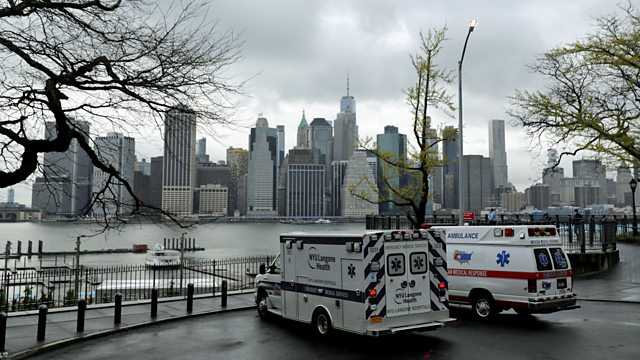New York emerges from a nightmare
New York after the colossal impact of Coronavirus; a social media video highlights domestic abuse in Jordan and Covid-19's impact on Bangladesh's garment factories.
Stories from New York, Jordan and Bangladesh.
As New York begins to re-open after six weeks in lockdown, the state’s governor remarked that New Yorkers had been to hell and back. More than 159,000 have been infected with Covid-19 in New York City alone, and there have been at least 12,000 confirmed deaths due to the virus. The sound of ambulance sirens has replaced the bustle of Times Square and makeshift morgues have been set up in Brooklyn. The City which endured the horror of the 9/11 terror attacks and the economic downturn of the financial crash has now been battered by the virulent spread of Covid-19. Nick Bryant has felt the impact on the city and on his own personal life as he prepares for the birth of his child.
According to the UN, at least 15m more cases of domestic violence are predicted around the world this year as a result of pandemic restrictions. And they expect a further 15m for every three months that the lockdown is extended. Women’s rights groups across the Middle East say there has been a surge in reports of domestic abuse cases. In Lebanon, calls to a government domestic violence hotline have doubled. In Tunisia, authorities say cases have increased five-fold. In Jordan, a video of a woman issuing a tearful cry for help one month ago went viral. Charlie Faulkner has the story.
Seven years ago, the Rana Plaza factory in Bangladesh collapsed in less than 90 seconds killing 1,134 people and laying bare the working conditions of thousands of garment workers. The incident sparked outrage and retailers – many of them western brands – were forced to act to improve safety standards. Conditions improved, but now the garment workers face another threat: Covid-19. Many retailers are cancelling orders or faced with travel restrictions. Bangladesh is the top garment exporter in the world after China and is heavily reliant on European and American orders. The sector employs more than 4 million workers – mainly women. They are once again fearful for their future and their livelihoods, finds Christine Stewart.
Caption: (Image: Ambulances parked with the Manhattan skyline in the background during the coronavirus outbreak in New York, U.S. Credit: Reuters/Andrew Kelly)
Last on
More episodes
Previous
Broadcasts
- Sat 2 May 2020 21:06GMT���˿��� World Service
- Sun 3 May 2020 03:06GMT���˿��� World Service
- Sun 3 May 2020 09:06GMT���˿��� World Service

